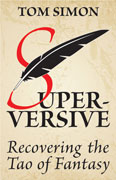Review: Circle of Light, by Niel Hancock
Not long ago, Tor Books released a new edition of the Circle of Light tetralogy, but Niel Hancock continues to be a rather obscure author. It is difficult to understand, or even to remember, the fanfare that attended the series’ first publication. These were perhaps the first books ever to proclaim their author a new Tolkien on the frontcovers: ‘A magnificent saga for all who love THE LORD OF THE RINGS!’ In fact the resemblances are few and feeble, but it was a portent of worse things to come. [Read more…]








Recent Comments